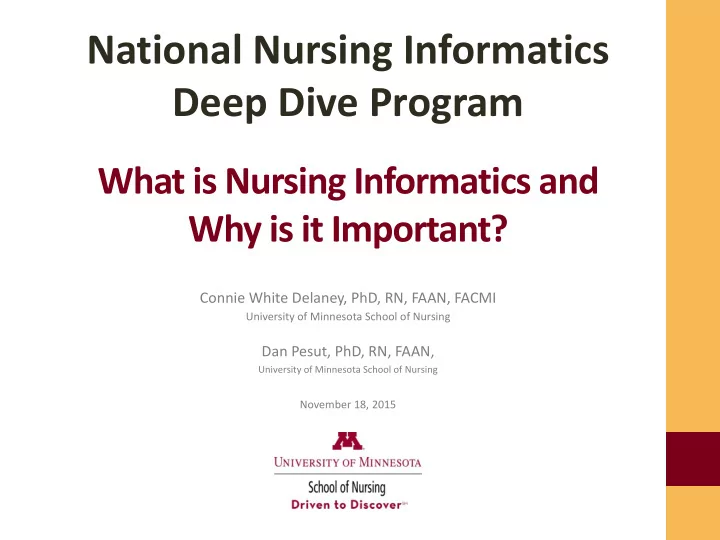

National Nursing Informatics Deep Dive Program What is Nursing Informatics and Why is it Important? Connie White Delaney, PhD, RN, FAAN, FACMI University of Minnesota School of Nursing Dan Pesut, PhD, RN, FAAN, University of Minnesota School of Nursing November 18, 2015
Disclosures • There are no conflicts of interest or relevant financial interests that have been disclosed by these presenters or the rest of the presenters and planners that apply to this learning session.
Questions to Think About 1. What are the major health care trends affecting health and care delivery? 2. What transformations do you see in nursing education in response to these trends? 3. What content and learning methods would you consider no longer relevant? 4. What content and teaching methods would you consider need to be added?
Amina in the Nexus National Center for Interprofessional Practice and Education. (2014, November 25). Amina in the Nexus narrated video [Video file]. Retrieved from https://www.youtube.com/watch?v=DzChp4bvaas&feature=youtu.be
Health Care Trends • Learning Health System • Person-centric care • Connected communities • Precision/personalized health • Quadruple Aim
The New Future for Nurses Will Be Driven By: • Accelerated change • Fast innovation • Smart technology • Predictive systems • Connected markets • Digital everything • Mobile commerce Image: http://www.accelerationwatch.com/ Canton, J. (2015). Future Smart: Managing the Game-Changing Trends That Will Transform Your World. DeCapo Press .
A system that is designed to generate and apply the best evidence for Vision the collaborative health care choices of each patient and provider; to drive the process of new discovery as a natural outgrowth of patient care; and to ensure innovation, quality, safety, and value in health care. (Charter of the Institute of Medicine Roundtable on Value & Science-Driven Health Care)
2007 … Real-time access to knowledge Digital capture of the care experience Engaged, empowered patients Full transparency
LHS IOM Report (2007) Follow up Reports • Leadership Commitments to Improve Value in Health Care: Finding Common Ground • Evidence-Based Medicine and the Changing Nature of Health Care • Redesigning the Clinical Effectiveness Research Paradigm: Innovation and Practice-Based Approaches • Clinical Data as the Basic Staple of Healthcare Learning: Creating and Protecting a Public Good • Engineering a Learning Healthcare System: A Look at the Future • Learning What Works: Infrastructure Required for Comparative Effectiveness Research • Value in Health Care: Accounting for Cost, Quality, Safety, Outcomes, and Innovation • The Healthcare Imperative: Lowering Costs and Improving Outcomes • Patients Charting the Course: Citizen Engagement and the Learning Health System
Digital Infrastructure for the Learning Health System: The Foundation for Continuous Improvement in Health and Health Care
Precision medicine/health
ARE WE PREPARED TO LINK/EXPAND NURSING’S DATA?
EPIGENOME What makes the epigenome change? Lifestyle Environmental factors (such as smoking, diet and infectious disease) Ability of the epigenome to adjust to the pressures of life appears to be required for normal human health.
Quadruple Aim • Triple Aim • better care • better health • lower costs • Quadruple Aim that emphasizes the original three goals plus the goal of improving caregivers' experiences
Informatics in Perspective Biomedical Informatics Methods, Basic Research Techniques, and Theories Imaging Clinical Public Health Bioinformatics Informatics Informatics Informatics Applied Research And Practice
Future Work Skills 2020 1 Sense-making 2 Social intelligence 3 Novel & adaptive thinking 4 Cross -cultural competency 5 Computational thinking Definition: ability to translate vast amounts of data into abstract concepts and to understand data-based reasoning • 2020 Workforce Skills http://www.iftf.org/uploads/media/SR-1382A_UPRI_future_work_skills_sm.pdf
Recommend
More recommend